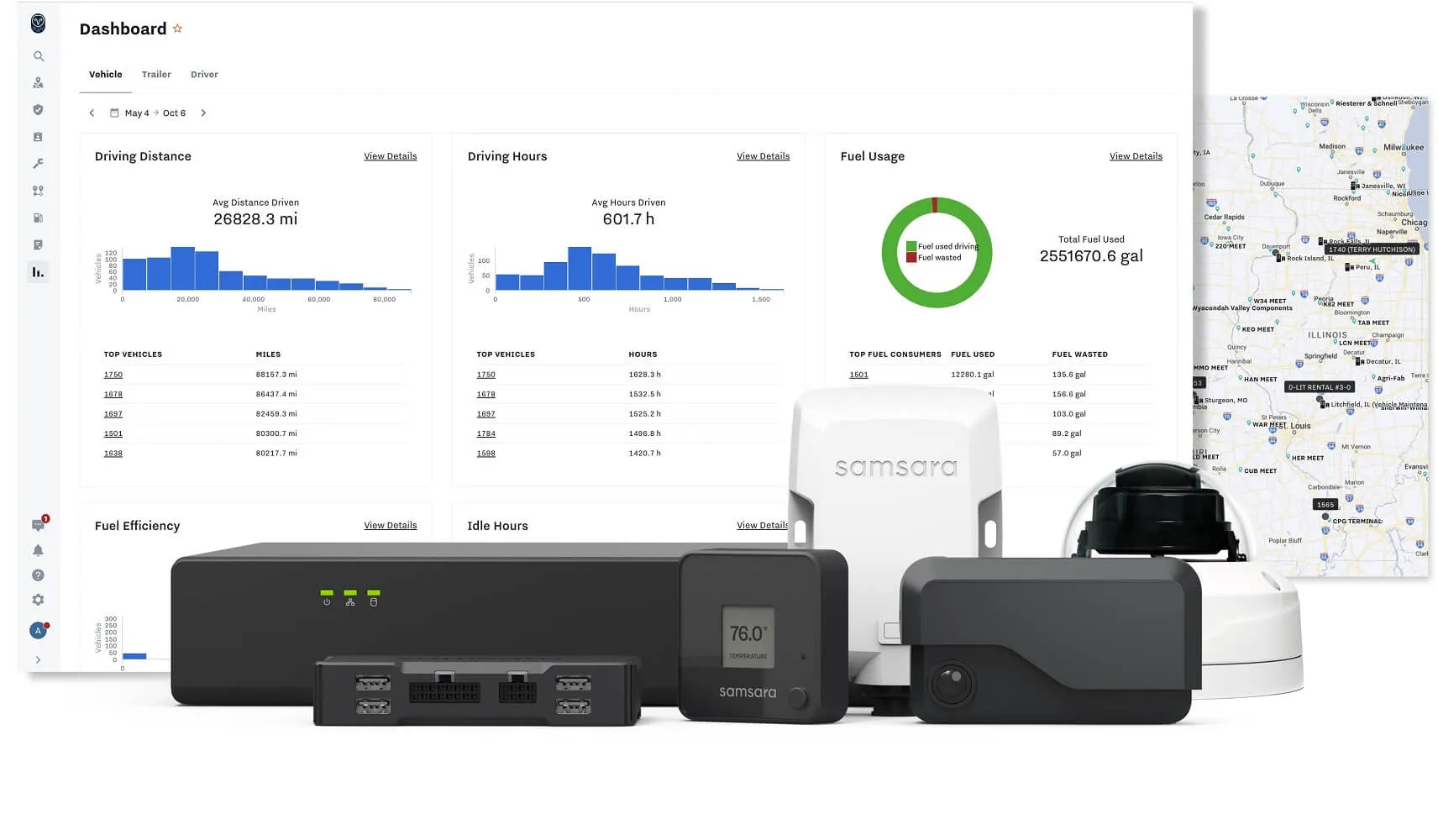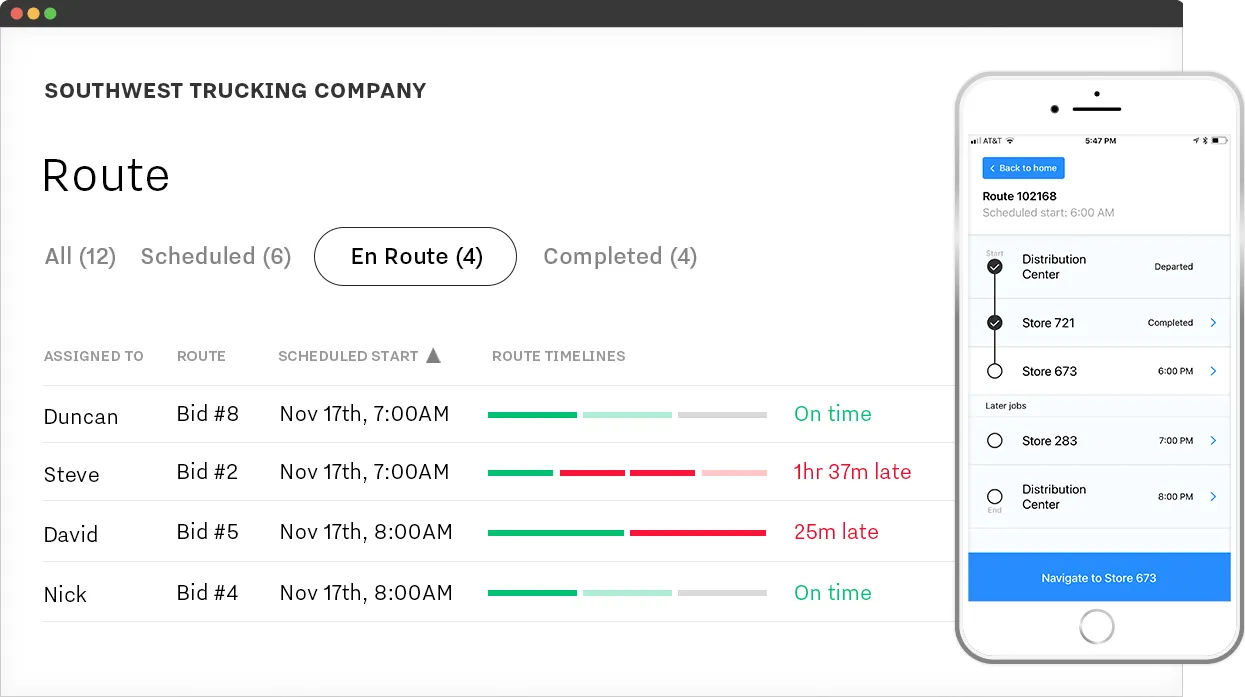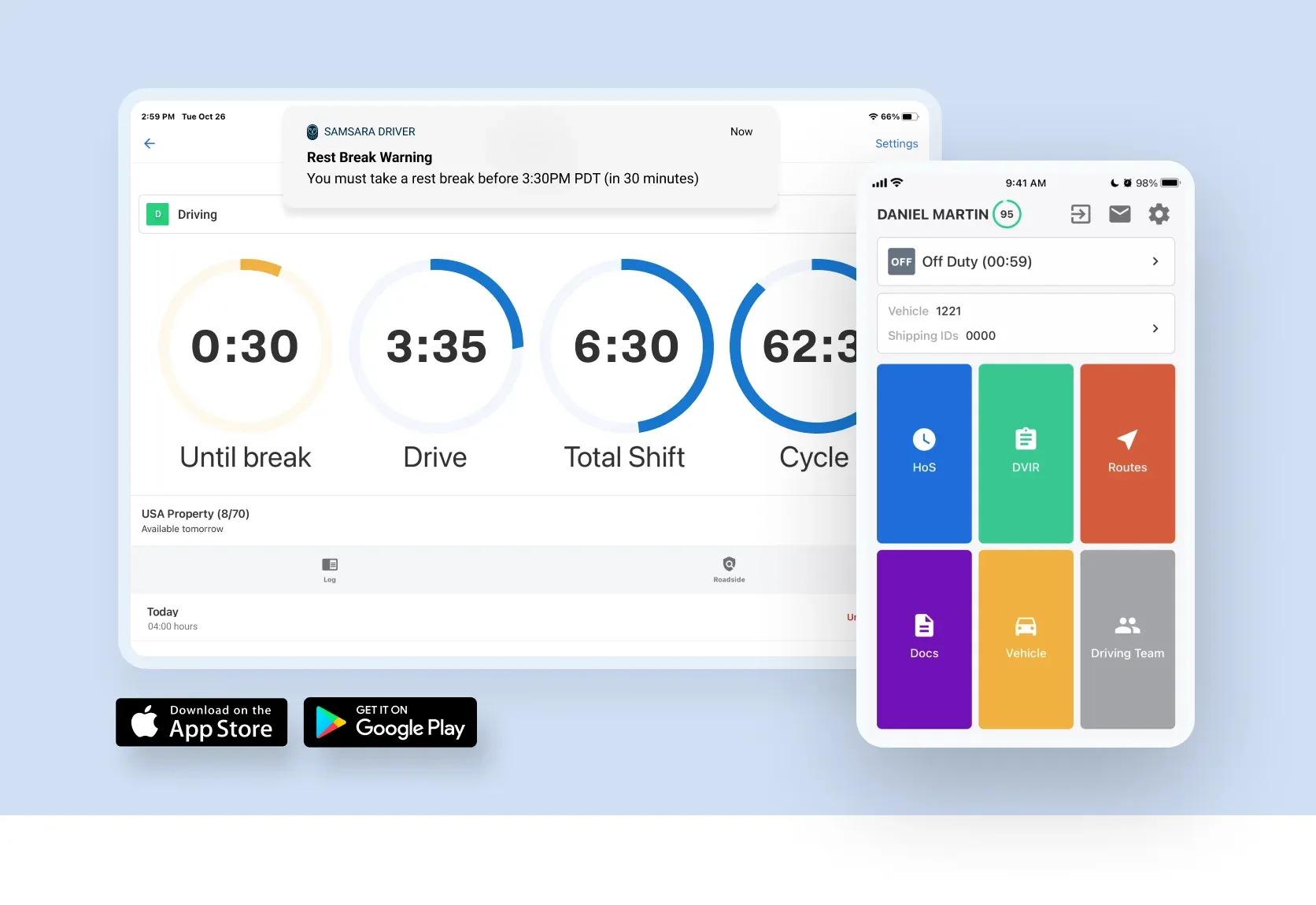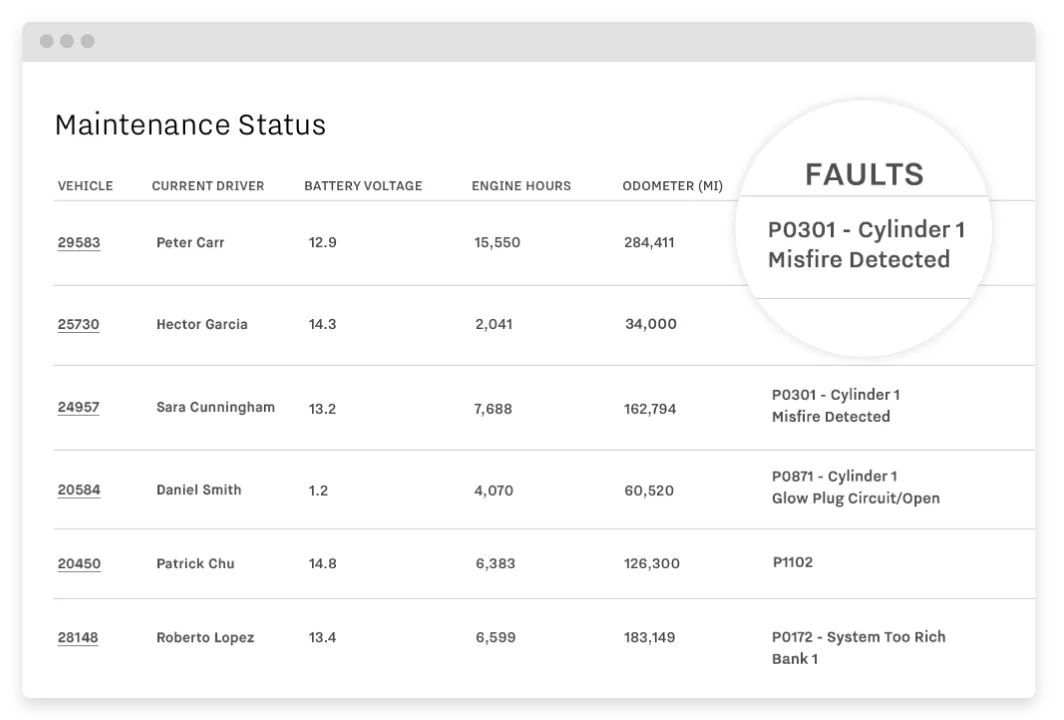Fleet operators face constant pressure: controlling rising fuel costs, optimizing dispatch efficiency, and ensuring strict regulatory compliance.
Samsara offers an unified solution for fleet management. Their hardware – GPS trackers, ELDs, and smart dash cams – feeds data into a central platform, providing a single point of insight for better decision-making.

But does it deliver, and is it a worthwhile investment?
This article contains our first hand experience with Samsara to help you make an informed choice.
Key Features
Let’s examine Samsara’s key features and their practical impact on your daily fleet management.
Note: Samsara images used for review under fair use.
1. Real-Time GPS Tracking

- Precise Location: Enables faster customer response, verifiable proof of service, and dynamic rerouting. Our dispatchers now use the real-time map to proactively inform customers of accurate arrival times, improving satisfaction.
- Route Optimization: Flags deviations, identifying inefficiencies and unauthorized stops.
- Empowered Dispatch: Provides dispatchers with up-to-the-minute vehicle locations for efficient communication and reliable ETAs.
2. ELD Compliance

- Accurate HoS Tracking: Ensures ELD mandate compliance. We haven’t incurred any Hours of Service violations in the past year.
- Streamlined Compliance: Facilitates vehicle inspections and IFTA reporting, reducing administrative burden.
- Driver Safety: Promotes adherence to hours-of-service regulations, mitigating driver fatigue.
3. Driver Management
- Driver Coaching: Provides safety scores and driving behavior insights, enabling targeted coaching. Fleet managers can review specific instances of harsh braking with drivers, leading to safer driving habits.
- Direct Communication: Facilitates seamless communication between dispatch and drivers.
- Customizable Safety: Allows for tailored monitoring based on vehicle type and road conditions.
- Simplified Logging: Offers an intuitive interface for accurate driver work status logging.
4. Vehicle Maintenance

- Proactive Alerts: Monitors vehicle health to identify potential issues early, preventing major breakdowns.
- Data-Driven Scheduling: Schedules maintenance based on actual vehicle usage, optimizing maintenance cycles.
- Fuel Efficiency Insights: Tracks fuel consumption and identifies potential issues like aggressive driving or fuel loss.
- Predictive Maintenance: Alerts for potential mechanical problems, minimizing downtime and repair costs.
5. AI Dash Cams
- Enhanced Safety: Provides video evidence and AI-powered alerts for events like harsh braking or potential collisions.
- Incident Review: Offers clear video footage for accident analysis and claims processing.
- Distraction Monitoring: Detects and alerts on potential distracted driving events.
- Reliable Recording: Captures high-quality video evidence of incidents.
6. Route Optimization
- Intelligent Planning: Considers traffic, delivery windows, and driver preferences for efficient routing.
- Dynamic Rerouting: Adapts to real-time traffic conditions and delays.
- Cost Reduction: Minimizes mileage and fuel consumption.
7. Customizable Dashboards
- Personalized Views: Allows users to configure dashboards to display key performance indicators.
- Granular Analysis: Enables filtering data by vehicle groups or individual drivers.
- Actionable Reporting: Generates reports on safety, compliance, and fuel efficiency.
- Data Integration: Allows for data export and integration with other systems.
8. Asset Tracking
- Comprehensive Visibility: Tracks trailers, equipment, and cargo.
- Improved Utilization: Helps prevent loss and optimize resource allocation.
- Real-Time Location: Provides immediate insight into asset location and status.
9. Mobile Apps
- Mobile Workforce Management: Offers apps for drivers and managers for on-the-go access.
- Driver Tools: Enables drivers to log hours, conduct inspections, and communicate with dispatch.
- Positive Feedback: Indicates ease of use for mobile users.
10. Electric Vehicle Capabilities
- EV Performance Monitoring: Tracks charging status, battery health, and energy consumption.
- EV Optimized Routing: Factors in charging station locations and range for efficient EV routes.
- EV Performance Analysis: Allows for comparison of EV performance against traditional vehicles.
11. Trailer Management
- Streamlined Inspections: Provides tools for drivers to conduct and submit trailer inspection reports.
- Simplified Assignment: Facilitates easy trailer selection and tracking.
Samsara Hardware
Samsara’s system relies on integrated hardware for data collection.
- Vehicle Gateways: Provide GPS tracking, Wi-Fi connectivity, and vehicle diagnostics.
- Asset Gateways: Track powered and non-powered assets with durable, long-lasting batteries.
- AI Dash Cams: Capture video and provide AI-powered safety insights.
- Wireless Sensors: Monitor conditions like temperature and humidity for sensitive cargo.
- Driver ID Tokens: Enable accurate driver identification for hours-of-service tracking.
Pricing: How Much Does Samsara Cost?
Samsara does not offer exact pricing on their website and requires you to request a direct quote.
The annual cost of Samsara software varies based on a company’s specific needs, but the average cost is around $92,000. The maximum price for Samsara software is around $145,000.
Pricing breakdown (estimates):
- Software: Expect to see prices ranging from $27 to $33 per vehicle monthly, with the features you select impacting the final cost.
- Hardware: Hardware costs typically fall between $99 and $148 per vehicle, depending on your choice of equipment, from basic GPS trackers to advanced AI dash cams.
- Driver ID Tokens: While individually inexpensive (around $9.99 each), these costs accumulate across your driver pool.
- Powered Asset Gateway Plus: These units can cost around $756 per asset.
- Contract: Samsara commonly uses a 3-year contract.
Negotiating Your Contract: Don’t accept the initial quote. Negotiate software pricing, contract length, and explore volume discounts.
Customer Support
Samsara offers 24/7 support, but user experiences vary:
- Effective Support: Many users report prompt and efficient issue resolution.
- Inconsistent Customer Support: Some users experience long wait times and unresolved issues, potentially causing operational disruptions. Research recent user reviews for support experiences.
Pros and Cons of Samsara
Advantages
- Integrated Platform: Seamless hardware and software integration simplifies management.
- User-Friendly Interface: Generally intuitive, reducing training time.
- Accurate Tracking: Reliable and precise GPS tracking.
- AI Dash Cam Potential: Offers significant safety and cost-saving potential.
- Effective Route Optimization: Reduces fuel consumption and improves efficiency.
- Comprehensive Data and Reporting: Enables data-driven decision-making.
- Strong EV Management: Dedicated features for electric vehicle fleets.
- 24/7 Support Availability: Provides round-the-clock assistance.
Disadvantages
- Higher Cost: Generally a premium-priced solution.
- Long Contracts: 3-year minimum commitment may not suit all businesses.
- Inconsistent Customer Support: Variable user experiences with customer support.
- Potential Billing Issues: Reports of inaccurate billing exist.
- Additional Installation Costs: Hardware installation is typically an extra expense.
Samsara vs. Alternatives
| Feature | Samsara | Motive (KeepTruckin) | Verizon Connect | Teletrac Navman |
|---|---|---|---|---|
| Starting Price | Higher (Custom Quote) | Lower (More Transparent) | Mid-Range (Custom Quote) | Mid-Range (Custom Quote) |
| Contract | 3-Year Minimum | More Flexible Options | Typically Longer | Varies |
| AI Dash Cams | Advanced Features (Distraction, etc.) | Available, May Be Less Advanced | Available | Available |
| User Interface | Highly Rated | Generally Well-Liked | Can Be Complex | Can Be Complex |
| Integrations | Wide Range | Good Range | Extensive | Good Range |
| ELD Compliance | FMCSA Certified | FMCSA Certified | FMCSA Certified | FMCSA Certified |
| Asset Tracking | Yes | Yes | Yes | Yes |
| Customer Rating | Generally High, Some Support Complaints | High, Especially for Value | Mixed, Some Complaints About Complexity | Mixed, Some Complaints About User Interface |
| Overall | Best for comprehensive features, AI safety | Best for value, contract flexibility | Best for large fleets, extensive network | Best for specialized industries, customization |
Is Samsara Right for Your Fleet?
Samsara is a strong option for:
- Mid-to-Large Fleets: The breadth of features suits complex operations.
- Safety-Focused Fleets: AI dash cams are a key benefit.
- Data-Driven Organizations: Robust analytics and reporting capabilities.
- Fleets Adopting EVs: Dedicated electric vehicle management features.
- Those Valuing User-Friendliness: Generally considered easy to use.
- Businesses Tracking Multiple Assets: Ability to track vehicles, trailers, and equipment.
However, Samsara might not be ideal for:
- Small Fleets/Startups: Higher cost and long contracts can be a barrier.
- Basic Tracking Needs: More affordable options exist for simple GPS tracking.
- Highly Specialized Needs: May not cater to every niche requirement.
- Inconsistent Customer Support: Variable user experiences with customer support.
Our Take
Samsara is a powerful fleet management platform offering a wide array of features and we highly recommend it, especially for larger fleets. Its integrated system and advanced capabilities like AI dash cams can significantly improve safety, efficiency, and compliance. However, the cost and long-term contract require careful consideration according to your fleet size.
